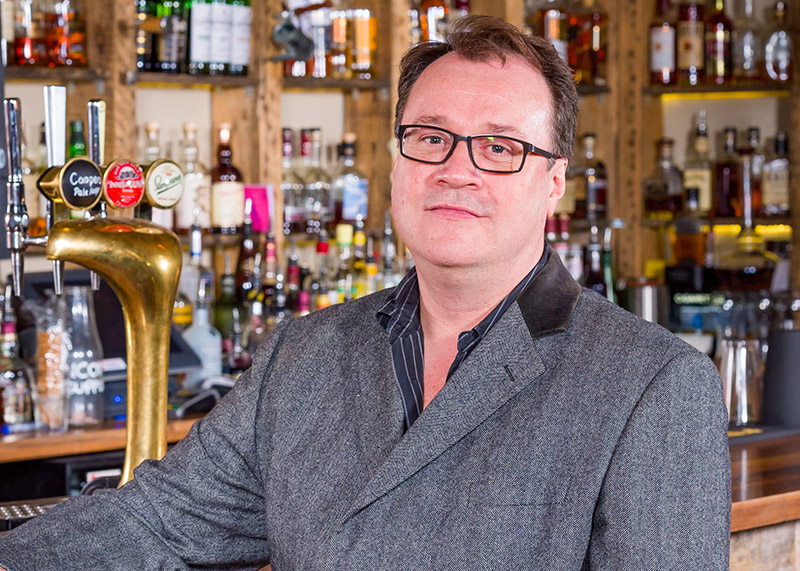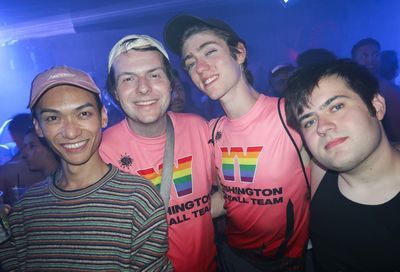Belarus Police Raid Gay Couple’s Home, Demand They Out Others
The raid on a gay couple's home is part of a larger, ongoing campaign in Belarus to criminalize sharing information about LGBTQ identity.

Police in Minsk, Belarus, raided the home of a gay couple and beat them. Andrei and Sasha, who are both university students, said that security forces barged into their home last fall and demanded that they unlock their smartphones and surrender the names of “gays in Minsk and Moscow.”
“They wanted to expose an ‘underground network’ of gay people in Belarus, following the example of Russia,” Andrei told the Associated Press. “They openly told us that if it is banned in Russia, then it should be banned in Belarus, too.”
According to human rights advocates, Andrei and Sasha are just two of at least 32 individuals who have been detained and beaten in seven different cities over the past three months, including 10 transgender and nonbinary individuals.
Some of those arrested were released after questioning, fined, and allowed to leave the country, while others still remain in custody, facing charges of “disseminating pornography,” which is illegal in Belarus and carries a prison term of up to four years.
The LGBTQ rights group TG House Belarus estimates that the number of people who have been detained may be even larger, but some people may be afraid to come forward and contact pro-LGBTQ advocacy groups.
The Belarussian government has cracked down on expressions of LGBTQ identity, mirroring similar actions taken by authorities in Russia. Although homosexuality was decriminalized in 1994, same-sex marriage remains illegal, and the country has no laws granting rights or legal protections to LGBTQ individuals.
Belarussian President Alexander Lukashenko — who has sought to ingratiate himself with Russian President Vladimir Putin — has mimicked Putin’s efforts to outlaw the dissemination of information about “non-traditional sexual relations,” or so-called “gay propaganda.”
Belarus, a former Soviet republic, has close geopolitical ties and a similar history and culture to Russia. Like Putin, Lukashenko routinely wins elections with upwards of 80% of the vote and effectively rules the country as an authoritarian “strongman,” imprisoning political opponents or public critics.
Since winning sixth term in 2020, Lukashenko’s government has arrested an estimated 65,000 people.
Like Putin, he has also derided Western powers as meddlesome foes intent on undermining the country’s culture and global standing. Russia used Belarussian territory, with Lukashenko’s permission, as a launching pad for its 2022 invasion of Ukraine.
While Belarus has not yet explicitly passed a law prohibiting the sharing of depictions of LGBTQ identity or details of LGBTQ-related activities, Natalya Kochanova, Lukashenko’s closest adviser and speaker of the upper chamber of parliament, has called for the adoption of similar laws in Belarus.
She has raised the possibility that lawmakers could declare — as did the Russian Supreme Court last year — that the “international LGBT movement” is an extremist group.
“We will also need to take similar measures,” Kochanova said, according to the AP. “We have family values, traditions we pass from generation to generation — traditions of family, Orthodox Christianity.”
Alisa Sarmant, the coordinator of TG House Belarus, told the AP that Lukashenko and politicians take actions to repress or silence LGBTQ individuals to “gain some kind of praise from Russian authorities and shore up support among conservative residents of Belarus.”
“To a large extent, it’s a carbon copy of what is happening in Russia, but in Belarus all these discriminatory practices take on uglier and harsher forms,” she said.
Under Lukashenko, LGBTQ groups have been shut down, security forces regularly raid nightclubs featuring underground LGBTQ parties, and authorities sometimes blackmail LGBTQ individuals into outing and entrapping others.
“Intimidation, arrests, and blackmail have been used in Belarus for years to create a so-called ‘LGBTQ+ database’ and declare an entire social group dangerous,” Pavel Sapelka of the Viasna Center, the country’s top human rights group, told the AP.
After Russia banned gender transitioning last year, despite not having a law outlawing transition-related procedures, transgender individuals in Belarus began having problems accessing gender-affirming care.
Sarmant says that this year, the government rejected over 80% of those seeking gender-affirming care or requesting to amend the gender marker on their official identity documents — a stark increase from a 10% to 15% rejection rate in 2020.
In April, the country’s Culture Ministry expanded the definition of “pornography” to include any depictions of “non-traditional relations,” meaning anyone possessing pictures or videos — even those that are not sexually explicit — that allude to or show same-sex relationships or homosexuality can potentially be prosecuted under country’s anti-pornography laws.
Ahead of next month’s presidential election, the proposed anti-LGBTQ law being pushed by Kochanova and other Lukashenko allies would punish anyone who is accused of promoting “non-traditional sexual relations” or “gender change.”
The legislation also likens those who share or disseminate pro-LGBTQ content to those espousing or disseminating pedophilic material — which itself carries a sentence of up to 13 years in prison.
Sarmant noted that TG House Belarus began a petition drive opposing the proposed, still ill-defined legislation, collecting 33,000 signatures. She told the AP that she suspects the recent raids of LGBTQ venues were a form of political retribution for opposing the bill “in order for everyone to hide, get scared, and — best of all — keep silent.”
As the crackdowns on LGBTQ visibility and LGBTQ-related speech continue, with LGBTQ individuals being subjected to horrendous physical abuse at the hands of security forces, some people are fleeing the country and seeking asylum abroad.
Andrei and Sasha, the couple whose home was raided, said that if the bill becomes law, they will leave rather than “wait for a prison term.”
Don’t miss a single issue of Metro Weekly. Click here for your free subscription.
Support Metro Weekly’s Journalism
These are challenging times for news organizations. And yet it’s crucial we stay active and provide vital resources and information to both our local readers and the world. So won’t you please take a moment and consider supporting Metro Weekly with a membership? For as little as $5 a month, you can help ensure Metro Weekly magazine and MetroWeekly.com remain free, viable resources as we provide the best, most diverse, culturally-resonant LGBTQ coverage in both the D.C. region and around the world. Memberships come with exclusive perks and discounts, your own personal digital delivery of each week’s magazine (and an archive), access to our Member's Lounge when it launches this fall, and exclusive members-only items like Metro Weekly Membership Mugs and Tote Bags! Check out all our membership levels here and please join us today!


























You must be logged in to post a comment.